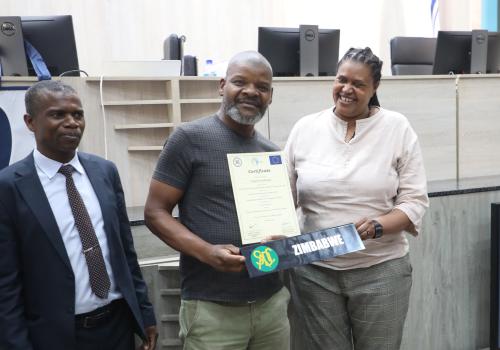The Bulawayo Leather Cluster in Zimbabwe expects to realise more business value from embracing Intellectual Property Rights (IPR) following a capacity building training by the Southern Africa Development Community (SADC) regional programme on Support to Industrialisation and the Productive Sectors (SIPS).
The intervention by SIPS to train small and medium enterprises (SMEs) in the leather sector from across the SADC Region sought to equip the SMEs with knowledge to harness the full value of Intellectual Property Rights including trademarks and patents, among others, arising from their innovations.
SIPS is a programme aimed at improving private sector participation in the regional leather, pharmaceutical and medical value chains in the SADC Region. The programme is supported by the European Union (EU) and the German Federal Ministry for Economic Cooperation and Development (BMZ) to facilitate development and expansion of regional value chains and promote dialogue between the private and public sectors.
Bulawayo Leather Cluster secretary-general, Mr Fungai Zvinondiramba, said that while the SMEs have many innovations their IPRs have not been registered and are therefore not fully benefiting from their products. He said the interventions by the SIPS programme will help to strengthen the value chains in the leather sector across the region. Most innovations in various sectors, including the leather industry, are not being protected through applicable intellectual property rights hence full benefits are not being realized.
Mr Zvinondiramba was among representatives of SMEs in the leather industry from Botswana, Eswatini, Lesotho, Democratic Republic of Congo, Malawi, United Republic of Tanzania, and Zimbabwe who participated in a SADC regional capacity building training workshop on strengthening regional and national IPR and Trade Related Intellectual Property Aspects of Intellectual Property Rights (TRIPS) compliance. The workshop was convened by the SADC Secretariat, in partnership with the African Regional Intellectual Property Oganisation (ARIPO) in Harare, Zimbabwe, from 5th to 15th October 2022.
“On the just-ended training, it was all about Intellectual Property Rights for SMEs. As you might know, most SMEs have not realised the full value of their intellectual property rights. These include trademarks and patents. SMEs have come up with a lot of innovations which they have not registered, there are also opportunities for developing Geographic Indications which create brands based on geographical origin. In other quarters, it is called geographic branding where we brand a whole region or province for its unique product,” he said.
A Geographic Indication is a sign or name on products that have a specific geographic origin and possess unique qualities or a reputation that are due to that origin. Mr Zvinondiramba said after the training programme, there was a realisation that there are opportunities for collective branding of SMEs.
“Benefits include the realisation of the intangible value of the different names that we have built over the years, and of course the knowledge that we can protect our products and innovations in Zimbabwe and the Region, even internationally,” he said.
Mr Zvinondiramba said that through support from the SIPS and Africa Leather and Leather Products Institute (ALLPI) initiatives, SMEs in the leather industry were being capacitated with machines through the clustering system in Bulawayo and Harare. The leather industry in Zimbabwe is being revived as there is a lot of capacity building targeting SMEs, big companies and also training institutions with support from the EU through ALLPI, which is a Common Market for Eastern and Southern Africa (COMESA) initiative. ALLPI was established in 1990 and rebranded in 2017 to enable it to support activities towards strengthening the leather value chain across the continent in a seamless and cost-effective manner.
At its prime in the 1990s, the leather sector in Zimbabwe was thriving, producing up to eight million pairs of shoes, but most established manufacturing firms later folded citing different reasons. However, through the Zimbabwean Government interventions that included the launch of the Zimbabwe Leather Sector Strategy 2021-2030 to anchor increased investment and maximising value-addition and beneficiation to promote export-led industrialisation, the sector is now on a recovery path.
The Zimbabwe Government also hopes that guided by the new strategy, the leather sector would increasingly lobby for the development and reform of 70 percent of the identified policies and legal frameworks for the transformation of the sector by 2030.
The representatives of SMEs in the leather industry from SADC Member States who attended the training workshop in Harare commended SIPS for the IPR training initiative, saying it will go a long way in developing and strengthening value chains in the sector in the Region.

